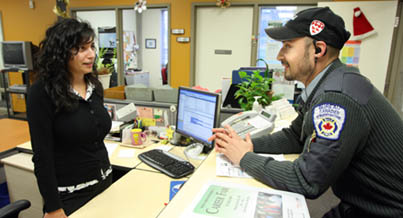Bourguignon Beat: Putting a name and face to McGill security
Bourguignon Beat: Putting a name and face to McGill security McGill University
User Tools (skip):
BOURGUIGNON BEAT
Putting a name and face to McGill security

Mateo Salazar, the omnipresent superman of McGill security, checks in on Lucy Nunez, senior administrative coordinator at the Career and Placement Service offices, on one of the numerous stops that make up his daily tour of campus.
Owen Egan
Those who believe the old maxim that there's never a cop around when you need one probably haven't been on McGill's downtown campus lately.
Since the beginning of the fall semester, a now familiar face has been walking the beat as the university's first Community Relations Patroller—a position created to make campus security more visible and accessible.
"Since Virginia Tech and Dawson, people want to feel safe," says Pierre Barbarie, Associate Director of University Safety, responsible for Security and Fire Prevention Services. "Card readers have made the campus more secure at night, but we wanted to have more presence during the day when faculty and staff are actually here. The presence of a Community Relations Patroller reassures people that we are there even when they don't need us."
Enter Mateo Salazar, contracted through the Canadian Bureau of Investigations and Adjustments (CBIA), as are all of McGill's security agents. The difference is that you won't see Salazar cruising campus behind the wheel of a car. More likely, he'll be standing in your doorway with a smile on his face, asking how you're doing.
His job is to get to know and be known by the faculty, staff and students who populate the McGill community, and he does so one building at a time, again and again, every day.
Salazar's 10:00 a.m. to 6:00 p.m. shift involves a slow sweep of 30 or 40 buildings, where he checks in on personnel, keeps an eye out for safety or security problems and generally tries to make sure everyone feels secure. In most buildings, people know him by name—and they seem to appreciate his presence.
"We didn't used to see security around very much," says Deborah Davies, administrative assistant in the Department of Electrical and Computer Engineering in the McConnell Engineering Building. "Now that Mateo comes around, we feel like there's someone watching over us. The professors are astonished that we have security keeping an eye on equipment, checking doors. He's made a really big difference."
Following Salazar around for a day, I hear similar comments from a variety of people, but in most cases, it's the frontline staff who have come to know him best. "Secretaries and cleaning people are the best people to know—they're the ones who really know what's going on in an office," says Salazar, a personable former bouncer and executive bodyguard.
In the McIntyre Medical Building, we take the elevator to the top floor and proceed to slowly make our way down 13 flights, stopping to chat with one or two people along the way. For me, some of the chats are breathless, but Salazar is clearly in good shape. He figures he probably walks about 35 to 40 kilometres a day while on patrol. Plus, though he's only 31, he has more than 20 years of martial arts training under his (black) belt.
"My vigilance, my discipline and my confidence all come from my training," he says, in the distinctive Joe Friday—"just the facts, ma'am'"—delivery that's become a bit of a trademark. "Besides, imagine you catch a guy stealing or something and you approach him. You've just become an obstacle between his freedom and possible incarceration, so you had better be prepared." He hasn't had to use those particular skills on the job, but he has earned high praise for the skills that got him hired in the first place.
"We wanted to put a name and face on security at McGill," Barbarie explained. "We were looking for someone with a strong personality, someone who would go up and ask people how they were doing. Mateo has that kind of personality. It's one of his strengths."
In McGill's University Safety Group, which includes Security and Fire Prevention Services, the words "community" and "service" are paramount. "We've worked hard at emphasizing prevention and not repression," said Barbarie. "We don't want people to think there's something wrong every time they see a uniform."
Based on the feedback both Barbarie and Salazar have received thus far, the plan seems to be working.
"When I first started, I'd show up in an office and everyone would say, ‘What's wrong?' but now when they see me, they realize it's because something is right."

